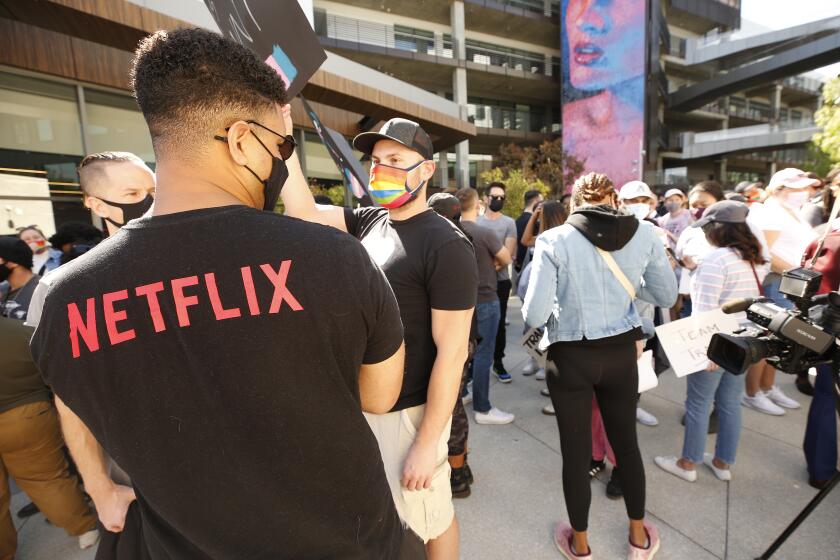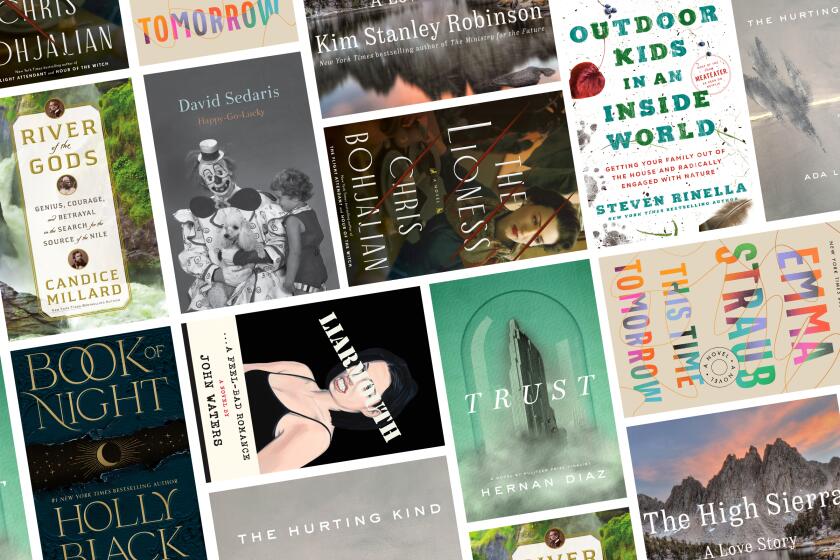Let David Sedaris offend you
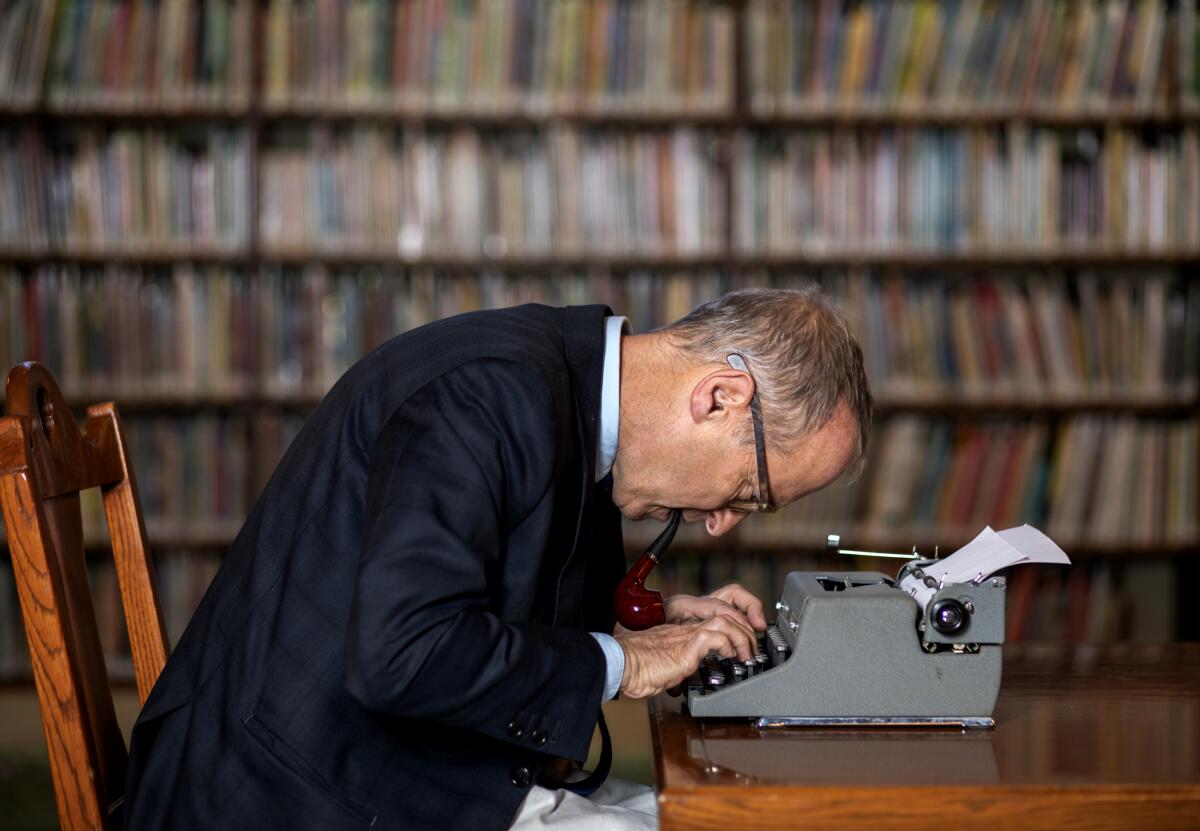
- Share via
On the Shelf
Happy-Go-Lucky
By David Sedaris
Little, Brown: 272 pages, $29
If you buy books linked on our site, The Times may earn a commission from Bookshop.org, whose fees support independent bookstores.
Author and humorist David Sedaris loves his job — which after all is making people laugh for a living — but that doesn’t mean he worries too much about offending people. Though the COVID-19 pandemic forced him to take the longest break from touring that he’s had in his decades-long career, Sedaris, 65, has been back in theaters around the country since last fall. He admits that he likes to get “a mix of laughter,” including the particular kind that comes from shock: “It’s a laugh that doesn’t sound like any other laugh. I love hearing it every night.”
When I spoke with the writer over the phone about his new collection, “Happy-Go-Lucky,” my laughter ranged across the spectrum; you could build a complete taxonomy of belly laughs and nervous giggles from the call alone. The topics themselves didn’t seem inherently funny: the deaths of family members, Black Lives Matter, Twitter fights, Balthus paintings, waiting on line at Starbucks. But Sedaris is funny — invariably. That’s his gift.
It’s a tricky one to have just at this moment. Comics are being attacked onstage (Chris Rock, Dave Chappelle) or accused of “punching down” on vulnerable populations (Ricky Gervais, Dave Chappelle again). The purported right to offend is very much subject to debate.
“Happy-Go-Lucky” is a snapshot of Sedaris’ life in the final years of the Trump administration, rendered in shadows and light. Even amid the overwhelming gloom of the pandemic, a summer of unrest and the death of a father toward whom he still has complicated feelings, Sedaris never loses his wit or his crack timing. He shared his thoughts with The Times on late-pandemic touring, generational shifts, his own bout of Twitter backlash and whether any topic is off-limits.
Our regularly updating 2022 Pride guide to culture will feature novels and memoirs from LGBTQ icons, must-see TV series, music, movies and much more.
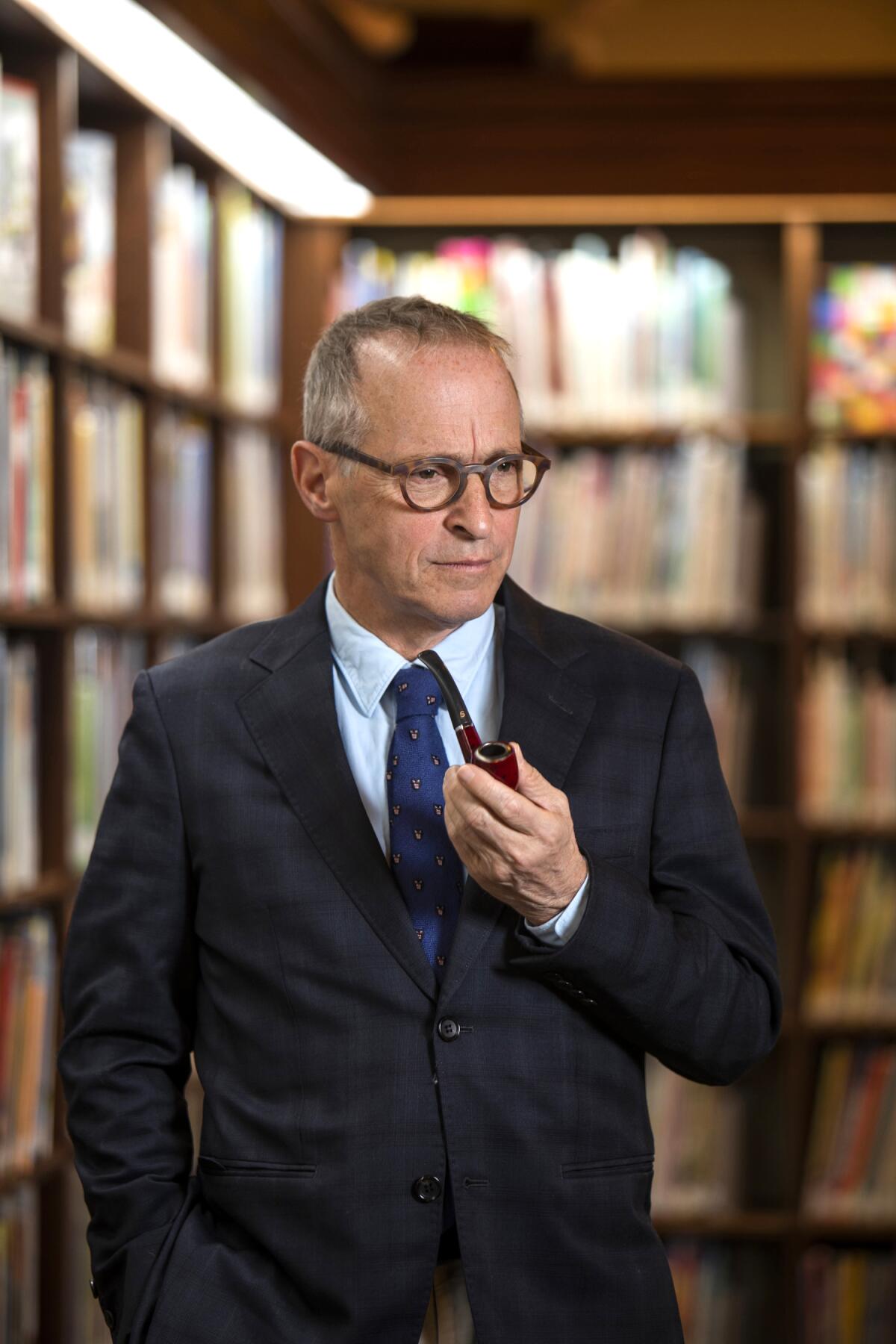
How does it feel to be back touring?
I went to 74 cities in the fall, and that felt really different than now. In the fall a lot of theaters initiated a vaccine check, so conservatives said, “F— you, I’m never coming to your theater again!” Then, in the spring, a lot of those same theaters dropped their vaccine checks, so liberals said, “F— you, I’m never coming to your theater again!” I mean, the poor theaters were just trying to survive, and they’ve managed to piss off everybody.
What is it about touring that you love so much?
Attention. I also think it allows me to be my best self. I’m my most gracious, caring, alert, kind self when I’m on tour. I know it’s weird to say those things about yourself, but I just feel like that’s when I’m at my best. But it also is such a great way to talk to people.
You are known for interacting with fans for hours; you seem like you have a genuine interest in people.
Yeah. But, more than that, I just remember what it’s like to be on that side of the table. I remember going to get a book signed, and they don’t look at you, they don’t talk to you, and you feel somewhat betrayed. Here you invested yourself in this person and their writing, and they couldn’t even be bothered to acknowledge that you’re a person. I think about that. I don’t ever want anyone to feel that way.
And yet, things seem edgy out there. Dave Chappelle got attacked during a set.
Somebody rushed the stage after my graduation speech [included in the book as “A Speech to the Graduates”] and tried to attack me. But it was the father of the school’s one conservative student apparently. He didn’t like the priest joke. All these security people were holding him back as he was still struggling trying to get at me.
You do traffic in some pretty dark humor. With lines always shifting over what’s acceptable, do you worry about offending people?
I just have to let myself be the judge. Just because one out of a thousand people doesn’t like something, that’s not enough of a consensus to get rid of it. I had a story about a woman who went on a date with this guy. He’d never been married. She asked him why. He said, “I guess you could say I have a fear of the c-word.” She leaned across the table, and said, “C—?” He said, “No, commitment.” So, to me, that’s such a good use of the word.
Well, some woman came up to me and slapped a piece of paper on my book-signing desk, and said, “Here’s the address where you can send my apology letter, for using that word onstage.” I thought, “I’m not writing you an apology letter, and I’m not going to stop reading this.” The theater erupted in laughter, but one person doesn’t like it so I’m going to get rid of it? It’s not like I told a joke about people with no legs, and you have no legs, so it made you feel singled out.
Netflix’s layoffs included dozens of people who promoted diversity on its social media channels, causing some to question its commitment to inclusion.
“Fresh-Caught Haddock,” from your new collection, focuses on the Black Lives Matter protests. Was there any part of you that worried about tackling that?
A lot of people would tell you that the last thing we need is a white middle-aged man talking about Black Lives Matter, but we all lived through that summer. Everyone has a story to tell about it. I’m not telling a story from the vantage point of a Black person. I’m not talking about discrimination I faced. I’m not trying to make it about me. But everyone lived through that period, and we all have a story to tell, and I felt insistent that mine was as valid as anybody else’s. And there’s a lot of stuff to make fun of. It’s like fruit that fell from a tree, just rotting on the ground. No one’s gonna collect this?
Do you think there are any topics that are not fit for humor?
No. I really don’t. I think timing is an issue. But I have a real problem with this idea now about “punching down.” I don’t think anything should be off-limits for humor if it’s funny. But, again, there’s a way to do it, a time to do it, and you have to think about those things.
A couple years ago I was asking the audience for jokes. I said, “I’m not hearing any gay jokes, and I know you have them. You’re just not telling them to me.” Someone said: [He retells an audience member’s tasteless joke that we, admittedly, both laugh at.] That’s horrific, but it’s a good joke. I always feel that if it’s a good joke, you have to tip your hat to it.
You mention in “A Speech to the Graduates” that you should “choose one thing to be terribly, terribly offended by — this as opposed to the dozens or possibly hundreds that many of you are currently juggling.” Why do you think we are juggling so many?
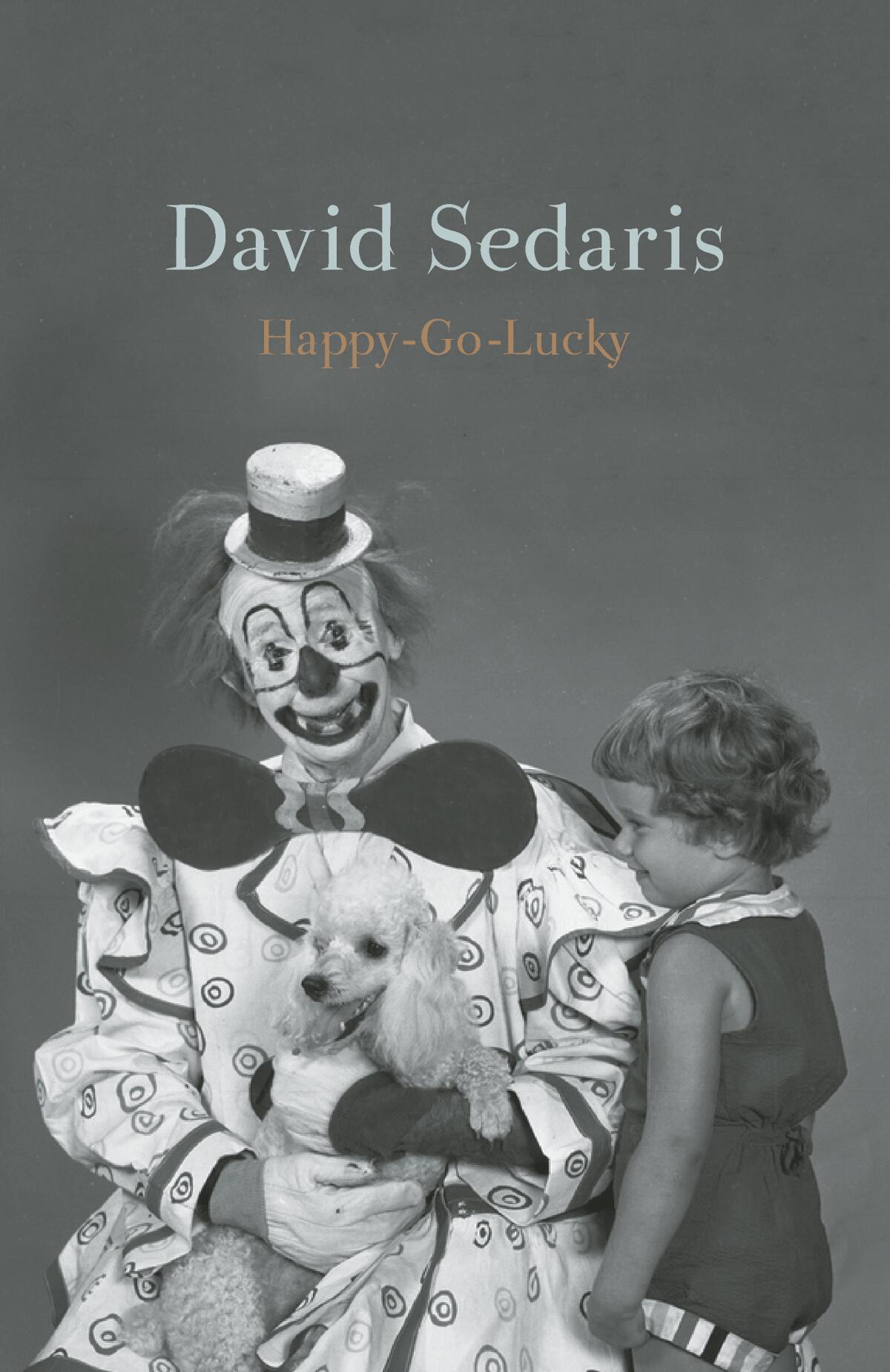
The internet. If I said something on the radio in 1992 that you didn’t like, you would write a letter. But then you’d go to the stamp drawer and realize you only had one stamp left. You would think, “Am I going to use that on my electric bill or to complain that this person just said ‘retarded’ on the radio?” You’d go with the electric bill. But now it’s free to complain.
A Twitter mob came after me a couple years ago for something I did on “CBS Sunday Morning.” I had written about egregious customer service. It was pretty clear that it had happened 10 years ago. I never read the comments, but my publisher told me they were saying I was trying to fire essential workers during the pandemic. How are you essential if you’re selling cups and saucers at a gallery in London 10 years ago? Or if you’re working as a lifeguard at the YMCA eight years ago? But I wondered, who are these people commenting? Though I didn’t wonder hard enough to look at anything they’d written, and I certainly didn’t wonder hard enough to respond to them.
How would you respond to someone who said that in early books like “SantaLand Diaries” you have a more working-class sensibility, siding with the retail worker, whereas on “CBS Sunday Morning,” you show off the privilege of your now more affluent life?
People were saying, “You’re so entitled,” but these were two egregious cases of horrible customer service, and anyone would have recognized them as such. I have every right to call them out. How much money I have or don’t have doesn’t have anything to do with it.
David Sedaris, my imaginary friend
You also tell those graduates in the speech, “Do not, however, petition to have a Balthus painting removed from the Met because you can see the subject’s underpants. The goal is to have less in common with the Taliban, not more.” If you think our culture is becoming more repressive, how do you think we get beyond that?
Make it mandatory for 12- and 13-year-old girls to appear naked in public all the time, and then we’d just get used to it. I mean, I don’t know.
One of the undercurrents of your work is the honesty. You can’t really run from your thoughts, no matter how mean they might be. We all have these mean thoughts, I think.
I’m convinced that everyone is like that in their head. When I’m at Starbucks, and there’s somebody at the front of the line who is dithering. Or they have a kid, and they’re like, “Well, what do you want?” “Oh, you do know what a cappuccino is!” Nobody in that line is saying, “Oh, I wish I had a kid so I could do that.” Everyone is thinking, “This horrible bitch needs to hurry up.” We don’t say it, but …
Like today, my plane landed at 3 o’clock. I thought I’d be home at 3:30 but I didn’t get home until 4:30 because there was an accident. When we passed that accident, I thought, “F— you for having an accident and making me sit in traffic for an hour!” But I don’t say it!
One thing I love about your work is there is an allowance for our interior life to be mean, messy or complicated.
Part of me thought I needed to end the book with the essay “Happy-Go-Lucky.” My father dies, and it’s kind of a lovely essay — it’s the best thing I’ve ever written. But, like you say, it’s complicated. So I continue, and I write another essay where I say, “I think I’ll miss him the same way I missed getting colds during the pandemic.” People are like, “Wait a minute! You just said you wanted to see him again, but now you feel this way?” Yeah.
You seem conflicted about a lot of things in the book.
I always feel like the right person could challenge my thinking about anything. If I sat next to the right person, maybe I could hear them when they explain why Trump was a good president. Of course this has never happened, but I’m not going to close myself off to the right person making a good argument. If somebody’s in my face about something, then I’m just going to close down. But I want to be able to hear people. To be honest, I’m not convinced I’m right about anything.
I think also, in a selfish way, you don’t want to end things. There are certain things you want to end. If someone was poking you with a sharp stick, you’d want to end that. But I got into a car once, and I started talking to the driver. He said, “I was told I’m not allowed to talk to you.” I called my agent and asked, “Did you say that?” He said, “Well, you were complaining about a driver you had a few days ago.” I said, “You can’t legislate this kind of thing.” I was complaining about the other driver, but I got a good diary entry out of it. It was annoying, but not so annoying that I wanted to stop it. I don’t want to end things.
Bethanne Patrick’s May highlights include new fiction by John Waters, Chris Bohjalian and Emma Straub, fresh David Sedaris, breakout poetry and more.
Malone is a writer in Southern California.
Sedaris will discuss “Happy-Go-Lucky” at Vroman’s in Pasadena on June 6 at 6 p.m.
More to Read
Sign up for our Book Club newsletter
Get the latest news, events and more from the Los Angeles Times Book Club, and help us get L.A. reading and talking.
You may occasionally receive promotional content from the Los Angeles Times.

